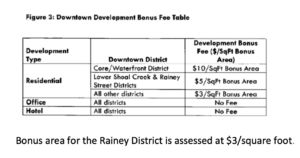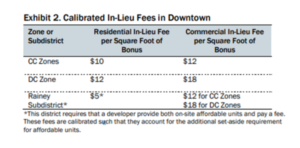Devil is in the details when it comes to recalibrating density bonus
Wednesday, April 21, 2021 by
Jonathan Lee City Council is set to approve a resolution recalibrating the Downtown Density Bonus program’s affordable housing fees, a first attempt to pick up the pieces of the city’s failed Land Development Code rewrite.
Almost all Council members have said they support recalibrating the fees, and none have said they are opposed. But the details – how the fees should be recalibrated and how often – are still up for debate.
The Downtown Density Bonus program gives developers more floor area ratio (FAR) in exchange for community benefits, including a fee toward affordable housing in lieu of providing on-site affordable housing. The program also requires developers to meet urban design and green building standards.
If not for a judge halting the LDC rewrite last year, the new fees would already be in place. Even without the LDC, the city can still change the fees. A resolution, if passed Thursday, would begin that process.
Council Member Kathie Tovo, who sponsored the resolution, wants to use fees calibrated in 2019 as part of the Land Development Code rewrite. Others, such as Council Member Paige Ellis, suggested recalibrating the fees to current market conditions before adopting new ones.
“I’m really keen on moving that forward, and not letting the perfect be the enemy of the good,” Tovo said.
Here’s how the current fees (top) compare to the 2019 fees (bottom):


The 2019 fees, however, can’t be directly applied to the current code.
“Because of differences between the current code and the proposed code,” Housing and Planning Officer Erica Leak said, “we would have to go back and and basically sort of translate and remap the proposed fees.”
Housing and Planning Department staff explained in a memo that the LDC fees “were calibrated based on the site’s base zoning (CC and DC in the proposed LDC), not the downtown sub-district as they are today.” Other parts of the Land Development Code, such as parking maximums and unlimited FAR, also affected the 2019 calculations.
Tovo also wants commercial and hotel projects to pay fees, as proposed in 2019.
If Council decides to use the 2019 fees, city staffers said they could tweak them to fit the current code by June. Recalibrating the fees for current market conditions would take until August.
Leak said, “It is certainly possible that what was proposed as part of the Land Development Code is no longer correct, for especially the commercial space.”
Improper calibration could have unintended consequences. Real Estate Council of Austin CEO Dianne Bangle told the Austin Monitor in an email that “it is incredibly important … that (density bonuses) are correctly calibrated. If they are set without regard for market forces, builders will likely change the project to comply with the code without the density bonuses.” Bangle said that when done correctly, density bonuses “benefit everyone.”
Whether the fees will be changed annually or less frequently is still up for discussion. Tovo argued that the fees should be changed every year as part of the city’s budget process. City staff recommends that the changes occur every three years “to provide predictability for the development community,” Leak said.
The resolution would also amend or remove part of the Downtown Density Bonus program that allows developers to exceed floor area ratio limits, translating to taller buildings. Tovo wants to prohibit these FAR exceptions until Council decides what community benefits should be required for that extra bonus area. FAR exceptions for three towers in the Rainey Street District passed Council earlier this month.
Housing advocacy groups cheered the fee revision, but said they could not support hardening FAR limits. “Repealing or amending this section could jeopardize funding for this critical community need,” Planning Our Communities said in a statement. HousingWorks Austin and Austin Housing Coalition released similar statements. Mayor Pro Tem Natasha-Harper Madison, among other Council members, also opposed the FAR exception clause.
Tovo emphasized there will still be time to figure out details after the resolution passes: “By passing the resolution, it doesn’t effect the change. It just starts the process of having that conversation.”
After implementing the changes to the Downtown Density Bonus program, several Council members hope to recalibrate other density bonus programs and add new ones around the city. Harper-Madison indicated that another resolution could be forthcoming, but did not provide a timeline.
Photo by Adriano Aurelio Araujo from Campinas, Brasil (Downtown Austin) [CC BY 2.0], via Wikimedia Commons.
The Austin Monitor’s work is made possible by donations from the community. Though our reporting covers donors from time to time, we are careful to keep business and editorial efforts separate while maintaining transparency. A complete list of donors is available here, and our code of ethics is explained here.
You're a community leader
And we’re honored you look to us for serious, in-depth news. You know a strong community needs local and dedicated watchdog reporting. We’re here for you and that won’t change. Now will you take the powerful next step and support our nonprofit news organization?












